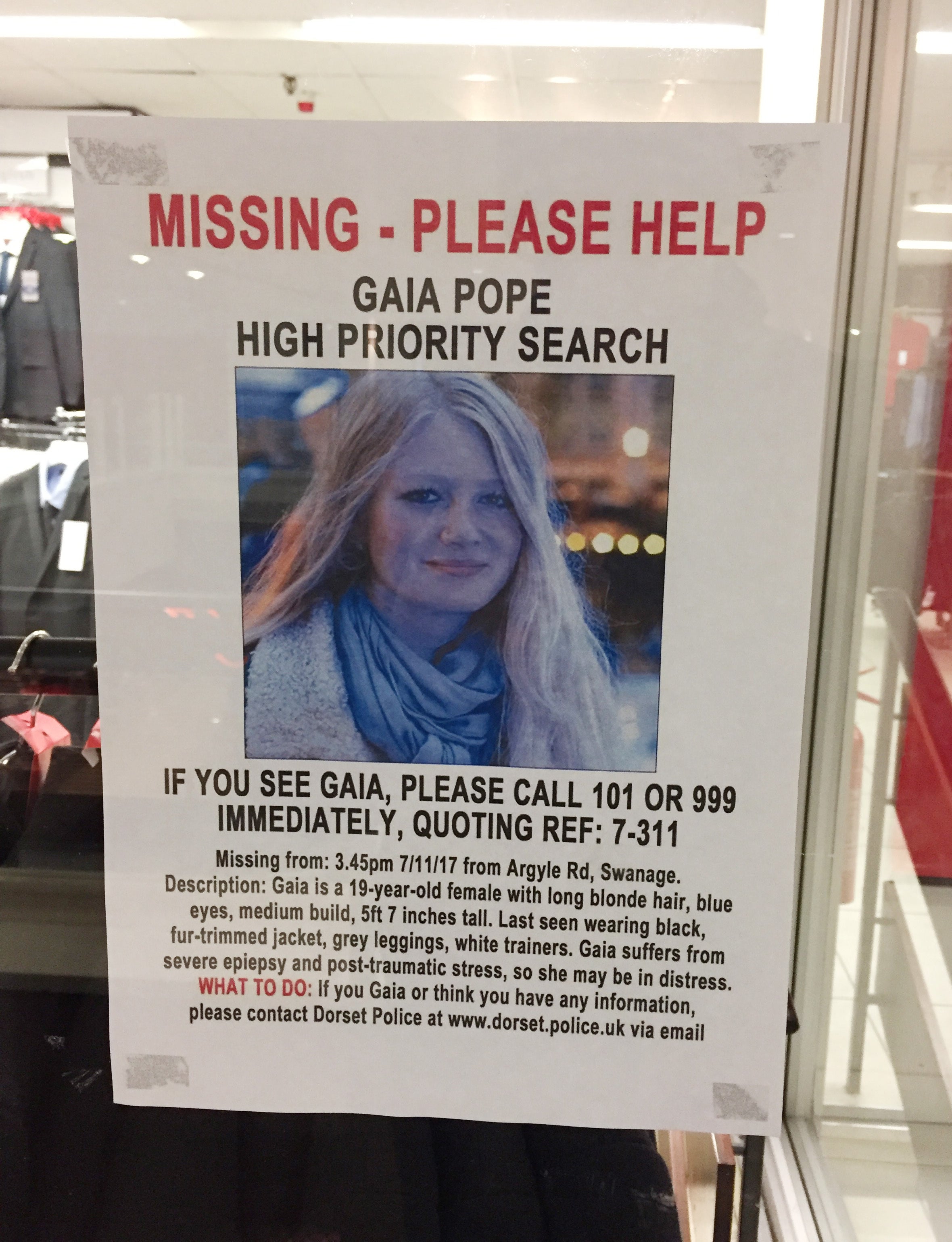Inquest hears of three-hour delay in logging teenager’s disappearance
A Dorset Police control room supervisor said a missing person report should have been made the first time the teenager’s worried aunt rang the force.

Your support helps us to tell the story
From reproductive rights to climate change to Big Tech, The Independent is on the ground when the story is developing. Whether it's investigating the financials of Elon Musk's pro-Trump PAC or producing our latest documentary, 'The A Word', which shines a light on the American women fighting for reproductive rights, we know how important it is to parse out the facts from the messaging.
At such a critical moment in US history, we need reporters on the ground. Your donation allows us to keep sending journalists to speak to both sides of the story.
The Independent is trusted by Americans across the entire political spectrum. And unlike many other quality news outlets, we choose not to lock Americans out of our reporting and analysis with paywalls. We believe quality journalism should be available to everyone, paid for by those who can afford it.
Your support makes all the difference.Police should have created a missing person report on teenager Gaia Pope-Sutherland within 10 minutes of her running away – rather than nearly three hours later, an inquest heard.
A Dorset Police control room supervisor said a report should have been made the first time the 19-year-old’s worried aunt rang the force.
Dorset Coroner’s Court heard Talia Pope phoned police at 3.41pm on November 7 2017 to report her niece was “distressed” and had run out her home in Swanage at 3.30pm.
But it was not until 6.15pm that a police call handler created a missing person report – despite several frantic calls from Ms Pope and the missing teenager’s mother Kim.
The college student’s disappearance sparked a large search operation in the Swanage area involving the police, Coastguard, National Police Air Service, Dorset Search and Rescue, and members of the public.
Eleven days later, on November 18, her body was found by police search teams in undergrowth between Dancing Ledge and Anvil Point, close to the coastline.
Miss Pope-Sutherland, who suffered from severe epilepsy, had been diagnosed with post-traumatic stress disorder after saying she had been raped by a man when she was 16, the inquest was told.
At the time of her disappearance, she was anxious about his imminent release from prison, where he had been serving a sentence for unrelated child sex offences.
The teenager’s aunt first told police she was missing in a phone call logged at 3.41pm, the court heard.
Ms Pope called again at 4.24pm, describing her niece as a “lost person” and saying she was “worried for her safety”.
She made a further call at 4.37pm, with control room dispatcher Lucinda Williams logging it as a “concern for welfare”.
Ms Williams said she believed there was an “expectation” Miss Pope-Sutherland would turn up for a GP appointment at 5pm.
A missing person report was finally created when Ms Pope called again at 6.15pm.
The court was told Dorset Police also received an email from Surrey Police at 5pm, detailing a call they had received from the teenager’s mother, Kim Pope, reporting her daughter missing.
Andrew Mustoe, who was a control room supervisor at the time, was asked by Dorset’s senior coroner Rachael Griffin to read a transcript of Ms Pope’s first call to police.
Ms Griffin asked: “If you had taken that call, would you have started a missing person log?”
Mr Mustoe replied: “Yes, I probably would. Her whereabouts couldn’t be confirmed.”
He was asked to read a transcript of the call Ms Pope made at 4.24pm, where she is reporting a “lost person” and confirming she had reported her niece missing earlier.
Ms Griffin asked: “Would you take that as a missing person report?”
Mr Mustoe: “Yes, it should.”
Ms Griffin asked: “Would you have treated that call at 4.37pm as a missing person report?”
He replied: “Yes.”
The coroner asked: “From your point (of view), you believe that missing persons report should have been started at 3.41pm on November 7 from the information contained in the phone call. Is that right?”
Mr Mustoe replied: “Yes.”
At 7pm, Miss Pope-Sutherland was graded as a “medium risk of harm” and in the early hours of the following day upgraded to “high risk”.
Caoilfhionn Gallagher QC, representing the teenager’s maternal family, asked: “Would you agree this was a key time to take urgent action to attempt to find Gaia before it has got dark and given her level of vulnerability?
Mr Mustoe replied: “Yes.”
Asked about the ‘golden hour’ for locating missing people, Mr Mustoe said: “It is an immediate opportunity to locate someone who is missing.
“I’ve reflected upon this incident and yes, I think I probably could. We could have got her recorded as missing earlier.”
The hearing heard Dorset Police did not make an official request to the HM Coastguard national HQ for a search of the Dancing Ledge area and nearby coastline until 12.02pm on November 8, 18 hours after first logging the teenager as missing.
The inquest continues.